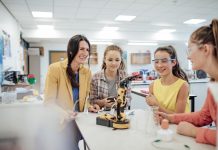Prof Dr Preethi Kesavan, Head, School of Technology at LSBF Singapore, describes the role of knowledge generated through scientific research for innovation and future societal development
Change is associated with innovation in the broadest sense. Natural events, conscious design of human ingenuity, or individual collaboration can all make a difference. Scientific advances, technological advances, and exciting ideas that inspire the masses are all examples of the changes brought about by research for innovation.
Science, technology, and research for innovation
Innovation is no longer limited to creating value for individuals, businesses, and society. The purpose of innovation is to help shape a smart future where people can enjoy the highest quality of life possible. As a result, innovation seeks smart solutions to key social illnesses, adopts a more proactive approach to predicting an uncertain future, and overcomes obstacles to the path to a smart future. We need to develop tactics. Modern research must consider the specific requirements of an intelligent future, including physical and social factors, as well as cultural factors.
Scientific study aids in the unravelling of the universe’s greatest mysteries and provides practical solutions to everyday challenges. The critical source of information is science; it has a defined goal and performs several functions that benefit our society, and it generates new information, enhances education, and raises our living standards.
To answer societal needs and address global challenges, scientific research is important. It is essential that citizens understand and engage with science, and that scientific information is simplified to allow them to make informed choices. Governments must legislate on societal concerns based on scientific understanding in areas such as health and agriculture. Climate change, marine pollution, ecological diversity loss and water security are key issues facing governments that require a deep understanding of science.
Sustainable development and policymaking
For sustainable development to be achieved, communities and government must be scientifically literate. Policymakers face difficult challenges when it comes to policymaking. Scientists need to understand these challenges and ensure that their results are relevant and understandable to the civic community. Today’s challenges cover the whole innovation life cycle, from research through knowledge development and execution, and cut across conventional field lines. Our efforts to achieve sustainable development must include science, technology, and innovation.
How to foster talent to forward the advancement of next-generation scientific research in Asia
For the growth of young scientists, a good research atmosphere is essential. Countries should provide talent with the best opportunity and resources for their development, in the short- or long-term.
Young researchers frequently face a lack of financing and support in completing their scientific endeavours. Therefore, more financing possibilities, specific initiatives, and collaborative networks should be created to promote their independence and scientific objectives. To ensure that science and technology continue to advance, we must constantly enhance evaluation mechanisms to nurture great young scientists.
Asia and Singapore promote world-class education both at home and abroad through a comprehensive range of undergraduate, postgraduate, and post- doctoral scholarships, allowing devoted students to reach their full potential. To create a thriving, diversified community of young scientific potential in Singapore, significant outreach programs are used to identify young talent.
Several Asian higher education institutions strive to become a global centre for scientific brilliance and for setting up innovation labs. They are committed to developing a new generation of bright scientists and researchers who will help the world achieve its goal of being a global science powerhouse.
As such, public universities in the ASEAN region, including Japan, have taken the lead in working with foreign universities for collaborative doctorate training. We need to adjust our strategy and policies to match the current problems. For example, LSBF Singapore has collaborated with the National Citizen Service Trust (NCS) to enrol its potential computer science graduates in the NCS-Nucleus Programme.
Asia has the potential to play an important role in the booming market for digital IT services such as big data and analytics, digital heritage modernization, and the Internet of things (IoT) system design to hire and develop talents.











